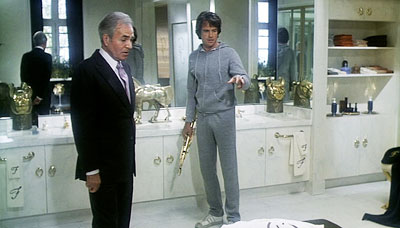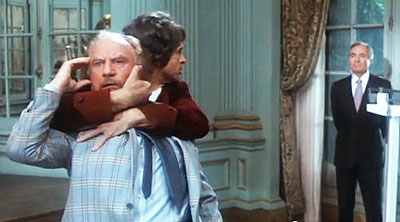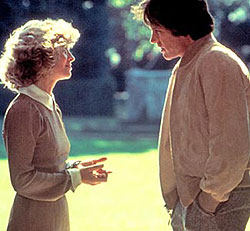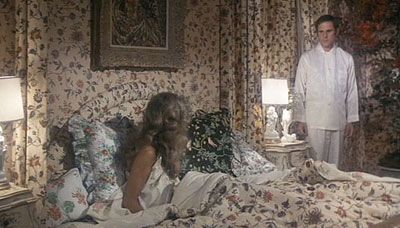That Beatty Touch: Heaven Can Wait
Published on December 5th, 2011 in: Comedy, Dancing Ourselves Into The Tomb, Issues, Movie Reviews, Movies, Soundtracks and Scores |Although it was released in 1978, Heaven Can Wait was one of my favorite films to watch again and again on HBO in the dawn of the 1980s.
Along with Foul Play, which was released in the same year (and is another fave), it’s a film that’s intended for adults, but which still possesses enough sweetness to appeal to a younger audience.

I was born in 1971 and only dimly aware of Warren Beatty’s status as a legendary Lothario and Hollywood heartthrob. I don’t even recall finding him particularly dreamy in Heaven Can Wait, though he plays Joe Pendleton with an adorably goofy charm (used again to great effect 20 years later in Bulworth).
Heaven Can Wait is based on a Henry Segall play of the same name and is a remake of the 1941 film Here Comes Mr. Jordan. The main plot is straightforward: Football player Joe Pendleton’s life is cut short due to an overzealous “escort” who’s new on the job (Buck Henry). The escort’s boss, the debonair Mr. Jordan (James Mason), must then fix the mistake. Misunderstandings, hijinks, and romance ensue thusly.
Such a brief plot description makes Heaven Can Wait seem insubstantial, and in truth, there’s nothing ponderous about it. Buck Henry’s character is not referred to as an angel; neither God nor religion is ever mentioned. Though there are quite a few football scenes throughout, they don’t overstay their welcome; this isn’t a “football movie” full of in jokes about the sport that only jocks will understand. It’s exactly this light touch which makes it so enjoyable.
One of the film’s most memorable qualities is the lovely score by Dave Grusin (The Goodbye Girl, The Champ, Tootsie). Heaven Can Wait was nominated for plenty of Oscars—including Best Original Score—yet it only won for Best Art Direction/Set Decoration. It has also suffered from a perplexing lack of attention in subsequent decades. Even I forgot that I’d ever seen and loved it as a kid until it was on TV a few years back; hearing the music completely awakened my memory. Grusin’s subtle and supple score utilizes soprano saxophone—the instrument played by Joe Pendleton in the movie— alternating between whimsical and bittersweet, a perfect complement to the film.
Despite its iconic presence, the score in Heaven Can Wait is, to quote the Dave Grusin Archive website, “used sparingly.” Furthermore, unlike many romantic comedies of later years, there is no cloying theme song to make us groan and roll our eyes. Rather than directing our emotions with music, the music supports our emotional response to the film.
The “romantic” part of the romantic comedy in Heaven Can Wait is also somewhat slight. There’s no denying that Joe is immediately intrigued by and attracted to schoolteacher-turned-activist Betty Logan, portrayed by the always-luminescent Julie Christie. Their romance is actually a subplot to the film’s fundamental quandary: finding the prematurely deceased Joe a new body to live out his assigned time on Earth.

What’s almost more compelling is the friendship between Joe and Max Corkle (Jack Warden), his trainer and closest friend. Max is the only one to visit Joe on his birthday, bringing him a cake and the good news that he’s been accepted to play quarterback for the Rams in the upcoming Superbowl. When Joe is placed in industrialist millionaire Leo Farnsworth’s recently-murdered body, he tries to make the best of it by having Max help him train Farnsworth’s now-alive body for the Superbowl.
Of course, he first has to convince Max that he’s actually Joe Pendleton, his friend, not Leo Farnsworth, the industrialist millionaire. Despite the fact that up until that point in the film, Joe and Max have only shared a couple of scenes, we can sense how much the friendship meant to both of them. To convince him, Joe tells Max a few tidbits that only he would know, much to Max’s alarm. This is the first the audience has heard of these tidbits, but we instinctively believe.
Not only does Beatty portray Joe with a likeable sincerity, he also produced the film, co-wrote the screenplay (with Elaine May), and co-directed (with Buck Henry). Beatty knows the movie intimately, but he also knows the character. Having so many fingers in the pie might make Heaven Can Wait seem like little more than a star vehicle for Beatty, but he originally wanted Muhammad Ali for the part (Segall’s original play was about a boxer, not a football player). With a lesser talent at the helm, this might have resulted in overplayed, cheesy dialogue and hammy acting, but Beatty proves his mettle by applying less instead of more.
Later in the film, Mr. Jordan finally fixes the escort’s mistake by placing Joe’s soul into the body of L.A. Rams quarterback Tom Jarrett. In an upsetting twist, Joe is the one who must pay for the mistake by having his memory completely wiped. But it’s Max who pays most dearly when he realizes that Tom is not Joe, and that Joe is in fact, truly gone. Unlike Tom and Betty, who experience a spark of something—recognition or déjà vu—when they meet at the end of the film, there’s nothing left for Max, who has lost his best friend twice. To me, this has always been the most heartbreaking part of Heaven Can Wait.
Yet Heaven Can Wait is also a comedy, one that is laugh out loud funny. Although Charles Grodin is both oily and dry as Farnsworth’s murderous assistant Tony Abbott, his scenes with Julia (Dyan Cannon), Farnsworth’s equally murderous and cuckolding wife, are ridiculous, annoying, and funny, The line about the dead mouse—”yes, but she relives it”—is a perfect mixed-up metaphor for the movie. Even more hilarious are Farnsworth’s household servants, particularly after they are marshaled to help “Farnsworth” work on his football skills and when their droll British personalities are positioned against Joe’s utter confusion over Farnsworth’s fashion peccadilloes (“Why do I have all these sailor outfits?”).
Farnsworth’s quasi-military garb is never fully explained and neither is his penchant for shooting a cannon at the same time every day. Such restraint doesn’t seem confusing; it further adds to the portrait of Farnsworth as a pompous jerk who probably deserved to be murdered by his wife and assistant. Interestingly, we never see the “real” Farnsworth, only Joe-as-Farnsworth, but this just makes things more comical.

Whoever the real Farnsworth was, he’s not the one for whom Betty falls. She enters the film as a firebrand, shouting at “Farnsworth” about how his business is hurting the people of her hometown. Joe might be in Farnsworth’s body, but he’s too sincere to be anyone but himself. Just like we never meet the real Farnsworth, we don’t get much of a chance to know Joe until he inhabits Farnsworth. Betty reveals who Joe truly is—kind and guileless—while Joe reveals that Betty’s obnoxious strategies belie her deep concerns for her friends and family. Because Betty knows the real Joe, she knows that when Farnsworth disappears, something is terribly wrong.
The chemistry between Beatty and Christie in Heaven Can Wait could be explained by the fact that they’d had a romance a few years earlier, but does it explain how, through a series of meaningful glances and not even one onscreen kiss, we are convinced that this couple is totally in love after knowing each other just a few days? Just like so many other aspects of Heaven Can Wait, the romance is underplayed but still, we believe it.
The setting of the film also contributes to the believability, although it is never discussed. Heaven Can Wait was filmed in part at Filoli Estate in Woodside, California, “an historic site of the National Trust for Historic Preservation.” Heaven Can Wait shows off the many exquisite examples of the Georgian style found throughout the estate, particularly the elaborate gardens, the transverse hall full of Greek columns, and the mural-covered ballroom where Joe sets up his weight-training equipment. Georgian architecture and interior design are named for the four British monarchs who ruled in the eighteenth and early nineteenth centuries: all named George. Naturally, someone as self-indulgent as Leo Farnsworth would have a home decorated in the style of English royalty.
Heaven Can Wait‘s Oscar for Art Direction/Set Decoration was well deserved. The scenes at the way station are minimalist and effective, full of waves of fog, an airplane, and little else. Many of the interior shots at Farnsworth’s home add to the ostentatious atmosphere of his world. Julia’s bedroom, for example, is floor to ceiling Laura Ashley-style floral prints, one of the most ghastly design schemes imaginable, but one that was quite trendy at the time. It also perfectly reflects Julia’s hysterical personality.

Equally fitting are the costumes worn by Julie Christie and Dyan Cannon, designed by the legendary and influential Theadora Van Runkle, who designed the costumes in 1967’s Bonnie and Clyde, and who nearly single-handedly influenced the following decade’s love affair with 1920s and ’30s fashion. Betty’s grey suit, worn when she first meets Joe/Farnsworth, is striking yet classy, while the brown silk dress she wears to the garden party is stunning and timeless. Befitting her nouveau riche personality, Julia wears a series of ensembles that resemble the draped jersey gowns popularized by Halston at that time, but her fuchsia silk shantung suit with severely pointed shoulders is both outrageous and enviable. (Sadly, Ms. Van Runkle passed away earlier this month at the age of 83).
Heaven Can Wait is funny and touching without being self-consciously witty or overly ironic and believable without being heavy-handed. It’s full of understated, perfectly realized touches that elevate it from a standard romantic comedy into something today’s romantic comedies should follow more closely.
Time limit is exhausted. Please reload the CAPTCHA.